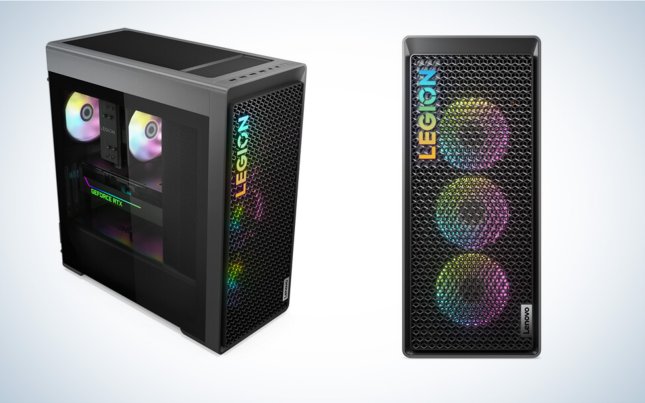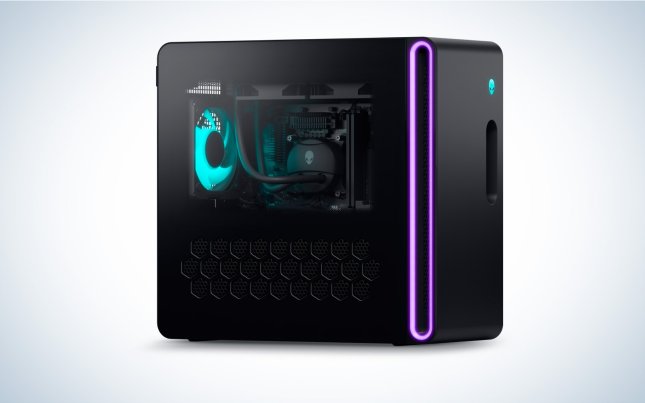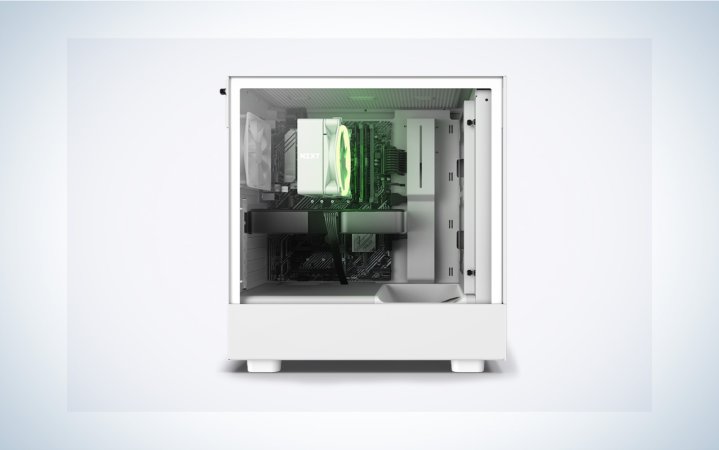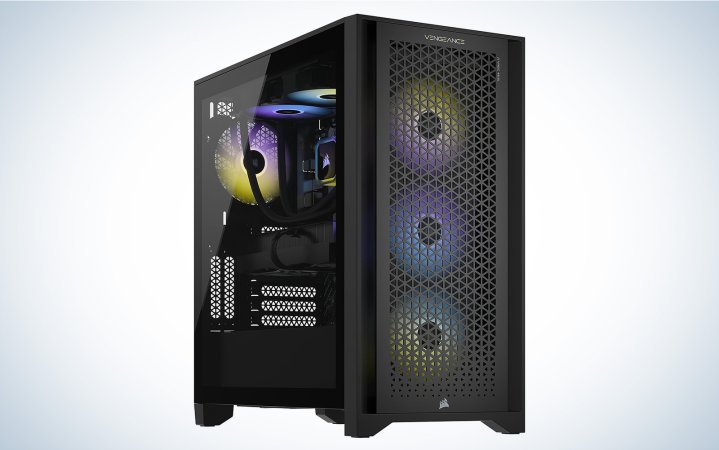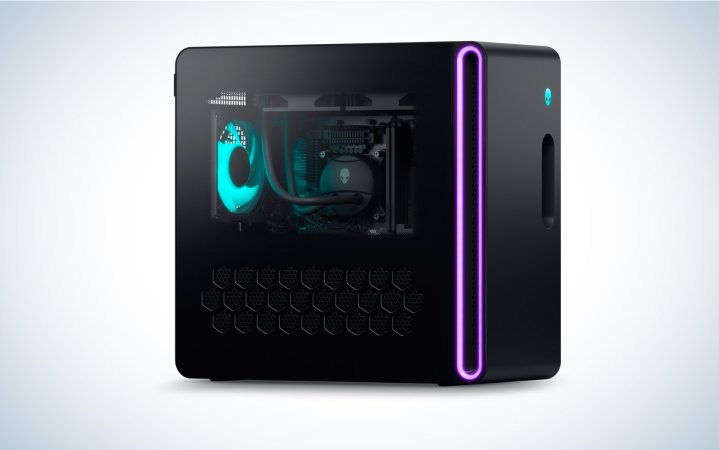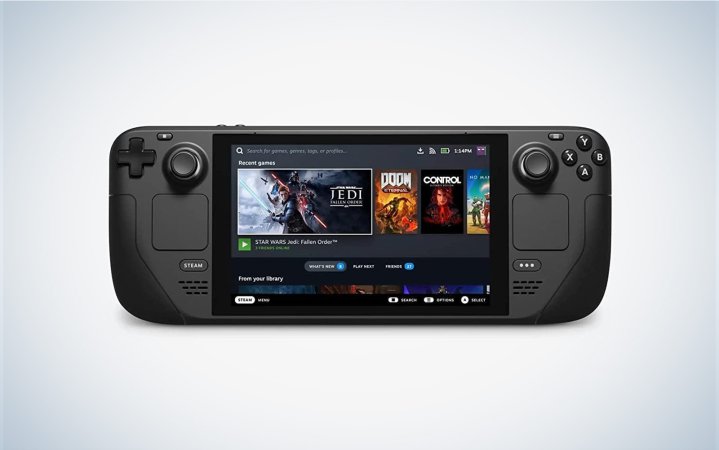We may earn revenue from the products available on this page and participate in affiliate programs. Learn more ›
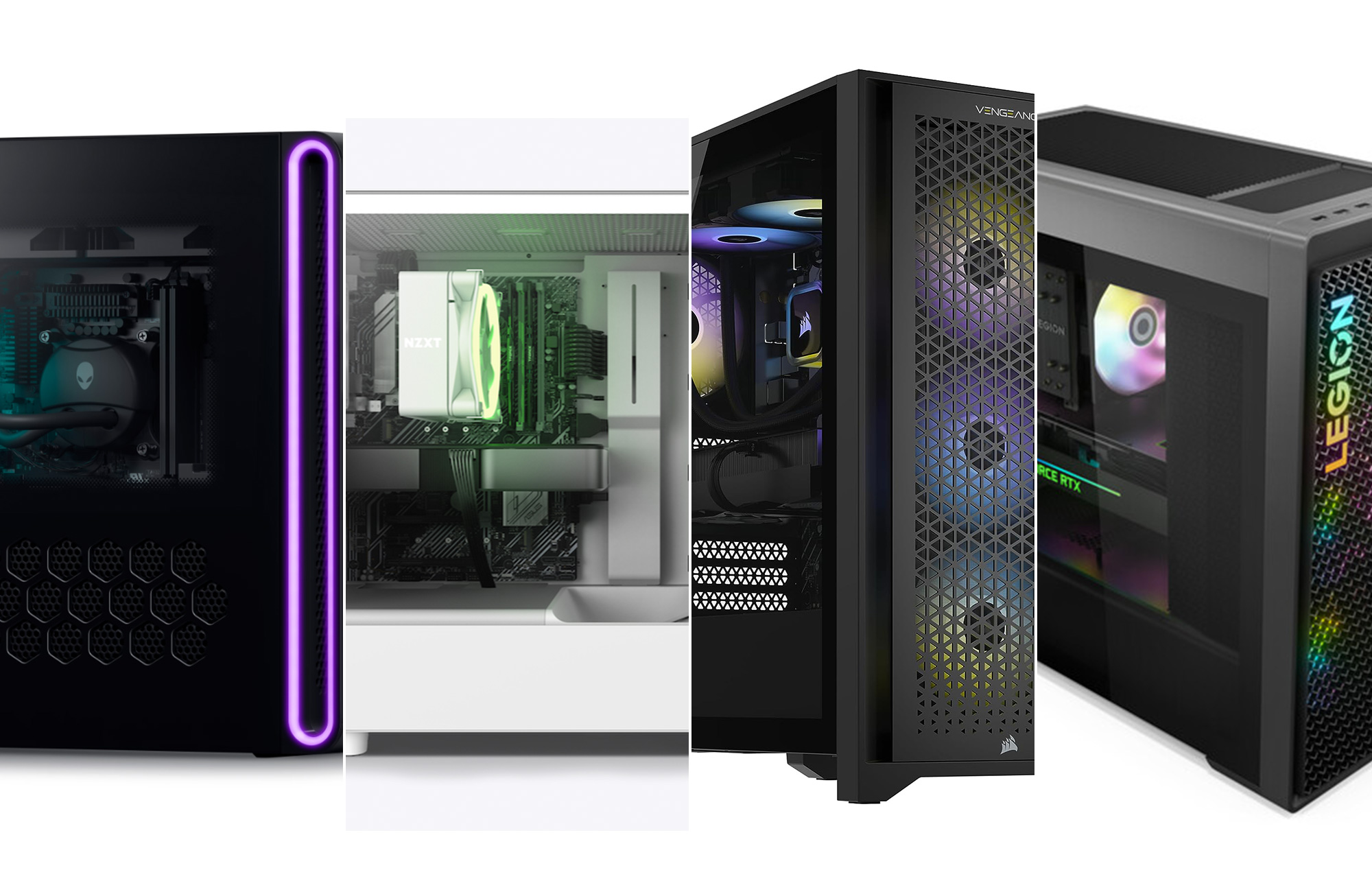
We’re big fans of gaming consoles like the PlayStation 5 and Nintendo Switch, but there’s something special about a gaming PC. Nothing beats the lightning-fast frame rates, ultra-high resolution, and lifelike graphics you get from a specced-out desktop. And, with some know-how, you can continuously upgrade your gaming PC’s internal components, allowing you to game for years to come.
While building a powerful computer from scratch can be rewarding, it’s not accessible to everyone. Buying a prebuilt gaming PC like the models on this list simplifies the daunting task of putting one together piece by piece. And these machines can rival some custom builds and allow you to play the newest AAA titles at the highest settings. Whether you’re new to the world of PC gaming or you’ve been doing it for years, this list of the best gaming PCs will have you playing some great games in no time.
- Best overall: Lenovo Legion Tower 7i
- Best budget: NZXT Player: One
- Best enthusiast: Corsair Vengeance i7400
- Best for beginners: Alienware Aurora R16
- Best under $1,000: Steam Deck
How we chose the best gaming PCs
Since getting my first desktop in the early 2000s—around when Counter-Strike was just becoming popular—I’ve had an undying love of PC gaming. On top of gaming, I’ve written about computers and peripherals for over a decade on sites like Popular Science, Popular Mechanics, and CNN Underscored. I’ve also tested all manner of PCs and laptops to find the latest and greatest devices. To find the best gaming PCs, I used my prior experience and researched the most popular models from trusted brands. I then selected the individual picks based on third-party reviews and consumer feedback.
The best gaming PCs: Reviews & Recommendations
While buying a prebuilt gaming PC is more straightforward than building one, you’ll still have some decisions to make. Many of the options on this list come in different configurations, and choosing the right mix of internal components can impact your short and long-term experience. That said, we chose options that offer the best balance between performance and price, with picks that run the gamut from graphical powerhouses to budget options. If none of these options are in your budget, check out our guide for the best cheap gaming PCs or laptops.
Best overall: Lenovo Legion Tower 7i
Best overall
Lenovo Legion Tower 7i
Pros
- Understated, upgradable design
- Caters to beginners and enthusiasts
- 4K-ready
Cons
- Bloatware is a little much
- No USB-C ports in the front
Specs
- Price: $2,989.99
- CPU: Intel Core i7-13700KF
- GPU: Nvidia GeForce RTX 4080
- Memory: 32GB
- Storage: 1TB
The Lenovo Legion Tower 7i provides an excellent balance of performance, price, and upgradability, making it a top choice for beginners and enthusiasts. There are four different configurations, with the top-of-the-line model featuring an Intel Core i9, Nvidia GeForce RTX 4080, 32GB of RAM, and a 1TB SSD. We recommend going with a configuration that lands in the middle: it includes an Intel Core i7 processor, Nvidia RTX 4080, 32GB of RAM, and a 1TB SSD. The model also has a powerful cooling system to help prevent your machine from overheating.
The Lenovo Legion Tower 7i also features a more understated design—something that comes down to personal preferences. The tower has a 3D mesh front bezel and a rail-side transparent glass panel, so you can admire the components inside (including an RGB fan that’s part of the cooling system). Meanwhile, the Legion Tower 7i offers a few open slots, allowing you to add more storage when the stock SSD inevitably runs out. All said, the computer offers excellent gaming performance and comes in different configurations, allowing you to choose the one that fits your budget.
Best budget: NZXT Player: One
Best budget
NZXT Player: One
Pros
- Affordable boutique experience
- Excellent 1080p performance
- Great warranty options
Cons
- Not overly powerful
- Some may feel the design is bland
Specs
- Price: $949
- CPU: Intel Core i5-124OOF
- GPU: Nvidia GeForce RTX 3060
- Memory: 32GB
- Storage: 500GB
If you’re on a budget and don’t mind a gaming PC with less powerful components, the NZXT Player: One is an excellent starter option. For less than $1,000, you can get an Intel Core i5, Nvidia GeForce RTX 3060, 16GB of RAM, and 500GB of storage. That’s enough power to get 170 frames per second while playing GTA V at 1080p resolution, according to NZXT. The company provides a boutique experience by providing expert assembly, customer service, and a warranty that covers product repairs, failure protection, and more.
The Player: One also supports overclocking the GPU to unlock higher frame rates and real-time ray tracing. You can also upgrade the machine with even more RAM (up to 32GB) and storage (up to 2TB), allowing you to keep up with the demands of AAA gaming. The tower that houses the components features an understated design focusing on airflow to keep temperatures low. NZXT also offers a tailor-made PC monitoring app to help manage performance, temperatures, and more.
Best enthusiast: Corsair Vengeance i7400
Best enthusiast
Corsair Vengeance i7400
Pros
- High-end specs
- You get expert assembly
- Great warranty and customer support
Cons
- Pricey
- Side door can be tricky to remove
Specs
- Price: $3,799
- CPU: Intel Core i9-12900K
- GPU: Nvidia GeForce RTX 4090
- Memory: 64GB
- Storage: 2TB
Enthusiasts who want the best should check out the Corsair Vengeance i7400. This gaming PC has top-of-the-line specs: Intel Core i9-12900K, Nvidia GeForce RTX 4090, 64GB of RAM, and 2TB of storage. That’s plenty of power to enjoy today’s most demanding titles—and enough power to play at the highest settings for a few years. The Vengeance (what a cool name) comes expertly assembled, giving you top-notch performance without the headache of putting it together.
What’s most impressive about this model is Corsair backs it with a two-year warranty and 24/7 support by phone or online. It’s nice knowing the company is confident in its products and protected from unexpected malfunctions. Despite being overkill for most gamers, the Vengeance is reasonably priced compared to other high-end prebuilt rigs.
Best for beginners: Alienware Aurora R16
Best for beginners
Alienware Aurora R16
Pros
- Well-balanced specs
- Small size
- Great for everyday use
Cons
- A little pricey as a beginner gaming PC
Specs
- Price: $1,749
- CPU: Intel Core i7-13700F
- GPU: Nvidia GeForce RTX 4070
- Memory: 16GB
- Storage: 1TB
Dell’s line of Alienware devices is legendary in gaming, and the Aurora R16 is one of the latest entries. What makes this a solid pick for beginners is you get current-generation specs in a small package—40 percent smaller than its predecessor—and it comes at an affordable price. And the rig does more than game; it’s also an excellent machine for getting work done.
Despite its smaller size, the Aurora R16 features specs that provide excellent performance, including an Intel Core i7-13700 processor, Nvidia GeForce RTX 4060, 16GB of RAM, and 1TB of storage. There are other configurations, but the base build will provide plenty of power for beginners. The Aurora R16 also offers what Dell says is a thermal strategy that can keep your rig cool and quiet, even during intense gaming sessions. Dell’s machine checks all the right boxes regarding hardware and performance, making it an excellent choice for beginners.
Best under $1,000: Steam Deck
Best under $1,000
Valve Steam Deck
Pros
- Powerful handheld gaming
- Customizable controls
- Portable design
Cons
- Poor battery life
- Still buggy
Specs
- Price: $399
- CPU: AMD Zen 2
- GPU: AMD 8 RDNA 2
- Memory: 16GB
- Storage: 256GB
The Steam Deck isn’t a gaming PC in the traditional sense; instead, it takes the concept of the Nintendo Switch and ups the stakes. The handheld Linux gaming PC has evolved into one of the best ways to enjoy top-tier titles, and it’s only $399. If you’re more of a casual gamer, the Steam Deck is an excellent way to spend a few hours playing Elden Ring or futzing around with an emulator.
A year after its release, the Steam Deck continues to offer impressive performance thanks to its powerful hardware, customizable controls, and software. What’s great is the Steam Deck keeps improving, thanks to Valve’s updates, so whatever problems exist today may be gone tomorrow. And support for new games is always being added, with support for titles like Cyberpunk 2077 and GTA V. Basically, it can do nearly everything your PC can—but in a much more manageable and affordable package.
What to consider when buying a gaming PC
PC gaming isn’t for the faint of heart—many of the best prebuilt models are expensive, with prices upwards of $1,500. Unless you have an unlimited budget, you may have to compromise when choosing components, whether by selecting a less powerful graphics card or less RAM. That’s why you must know what to look for so the machine you buy meets your expectations. Of course, the components in your prebuilt gaming PC are only part of the equation—you should also consider factors like peripherals, warranty, and upgradability.
Graphics Card (GPU)
The graphics processing unit, or GPU, is an essential component in your gaming PC and is responsible for rendering graphics and images. The GPU is the component we recommend upgrading if you want high-quality visuals and fast refresh rates. Keep in mind the cost of your PC can rise significantly if you splurge for a more advanced GPU.
Two companies make dedicated graphics cards for desktops, Nvidia and AMD, each offering a range of GPUs catering to different performance levels and budgets. You’ll want a graphics card from the current generation for the best possible performance. Nvidia currently offers RTX 40 and RTX 30 series of graphics cards, with the 40 Series offering the latest advancements, including a more advanced ray tracing feature known as real-time path tracing. Meanwhile, AMD offers the RX 7000 and RX 6000 series of graphics cards.
For a more in-depth explanation of why a graphics card is so essential, PopSci’s guide gives you the information needed to make the best decision for your situation. While most current and last-generation cards can provide an excellent gaming experience, newer models allow you to play the best, most graphic-intensive titles for longer.
Processor (CPU)
The central processing unit, or CPU, plays a fundamental role in the overall performance of your gaming PC and works in conjunction with the GPU to deliver smooth, high-fidelity visuals. Without a CPU, your computer couldn’t make the computations necessary to run programs, maintain stable frame rates, or handle networking tasks.
The easiest way to gauge a CPU’s power is to check its computing cores and clock speed. Compute cores give your processor the ability to handle multiple tasks at the same time. More cores mean better multitasking, especially with processor-intensive tasks like video encoding. Meanwhile, clock speed, shown in Hz, measures the number of computations or “cycles” the processor can make each second. For example, a CPU with a clock speed of 2.8 GHz executes 2.8 billion cycles per second.
As with graphics cards, there are two primary manufacturers for processors: Intel and AMD. Similar to GPUs, CPUs break down into performance tiers. Intel processors include Core i3, Core i5, Core i7, and Core i9. On the other hand, AMD includes Ryzen 3, Ryzen 5, Ryzen 7, and Ryzen 9. We recommend choosing Core i5 or Ryzen 5 CPUs and above if it’s in your budget.
Memory and Storage
Random access memory, or RAM, allows your applications to temporarily store data and quickly re-access it if necessary. We recommend 16GB for a gaming PC if your workflow involves using several applications simultaneously, as it directly affects the performance and responsiveness of your machine. The good news is that most gaming PCs, prebuilt or otherwise, will allow you to upgrade your RAM down the road and keep up with the demands of modern games and applications.
Your computer’s storage determines how much data you can store, including applications, media, and documents. While 500GB of storage sounds like a lot, today’s games require more storage than ever. For example, Call of Duty Warzone takes up nearly 200GB of storage, and other modern AAA titles are equally large. Your best bet is to opt for more storage when it’s within your budget.
There are several types of storage options to consider: hard disk drive (HDD), solid-state drive (SSD), and NVMe (Non-Volatile Memory Express) SSD. You’re probably most familiar with HDD, a mechanical storage device that uses spinning disks to store data. HDDs are popular because they offer high storage capacities at affordable prices. However, they deliver slower data access speeds and are more prone to mechanical failure due to their moving parts.
SSDs have more or less replaced HDDs in gaming thanks to quicker data access and shorter boot times. They are also less prone to failure since there are no moving parts. When choosing a gaming PC, we recommend you get one with an SSD. Similar to RAM, some machines will allow you to add additional storage. NVMe SSDs offer the fastest performance but can be the most expensive option on this list.
Peripherals
Prebuilt gaming PCs often don’t include peripherals like a mouse, keyboard, monitor, headphones or speakers—but that’s not necessarily a bad thing. Accessories included with your gaming PC or offered as add-ons are usually low-quality and won’t allow you to get the best out of your gaming experience. Something is better than nothing, but we recommend getting peripherals geared toward fast-twitch gaming, especially if you play first-person shooters. There is an entire industry of accessories and peripherals with dozens of options, so you’ll have to do a lot of research before picking something up.
FAQs
In general, building a gaming PC is more affordable because you have more control over the process. That includes choosing individual components based on your budget, allowing you to get what you want regarding performance and features. Of course, there is a learning curve when choosing parts and assembling your machine. Some might find a prebuilt model’s convenience and warranty support to be worth the extra cost.
The lifespan of a gaming PC will depend on several factors, including how well it’s maintained and the quality of its components. Generally, a gaming PC can last 2 to 5 years if you take good care of your machine, including updating the software and keeping it as dust-free as possible. However, a well-maintained machine can still experience diminishing returns in terms of performance over time. The good news is you can strategically replace individual components to help extend the life of your gaming PC.
The answer to this question depends on your preferences and priorities. A gaming console is more affordable and easier to use while offering exclusive titles unavailable on PC. That said, a gaming PC provides superior performance, customization, and upgradability. Gaming PCs can also be a device to edit photos and videos, browse the web, or write term papers, making them far more multifunctional than a console. Each option has pros and cons, so it comes down to aspects like your gaming habits and budget.
Final thoughts regarding the best gaming PCs
- Best overall: Lenovo Legion Tower 7i
- Best budget: NZXT Player: One
- Best enthusiast: Corsair Vengeance i7400
- Best for beginners: Alienware Aurora R16
- Best under $1,000: Steam Deck
A capable gaming PC unlocks access to a whole world of games and experiences console players just don’t have. You can run custom mods, max out settings for unmatched visuals, and tweak your setup exactly how you like it. And, while someday you may want to build your own machine, the best gaming PCs on this list provide an incredible experience right out of the box. No thermal paste skills necessary.
